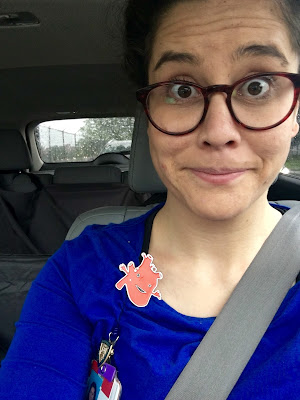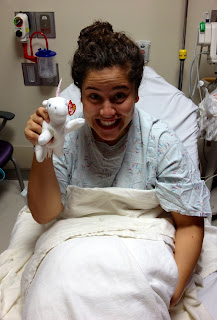Musings as a New RN
HI FRIENDS!
I've been working at my real-life, super amazing job for about 4 months now! I knew the learning curve would be steep, but I don't think anything in nursing school can really prepare you for all the different variables that come with working as a "real-life" nurse. I know everyone's experience is different, but I'd like to share a few observations that have definitely presented themselves as opportunities for growth.
1) Yes, some nurses still eat their young. It's unfortunate, but true, and I have been on the receiving end of passive-aggressive comments, or awkward interactions where I leave asking myself, "were they really just making fun of me? Do they not remember being a newbie?" BUT there are so many more nurses that don't eat their young, and who are incredibly supportive and enthusiastic about helping you along the way. In fact, one of my favorite, most beloved preceptors has gone to bat for me more than a few times after being met with attitude by some less-than-understanding nurses. So, don't get discouraged. Stick to the positive mentors that will help you grow, and, if you are feeling gutsy enough, kill the other, less-than-understanding nurses with kindness. It really messes with their heads.
2) Don't feel like you have to be friends with everyone on the unit, all the time. I think it's absolutely important to keep a good, working relationship between your coworkers, especially in a high-risk unit like the ICU. However, that's not the same thing as being best buds with everyone you meet. If you can communicate effectively, and help each other out, and be a good "neighbor" to your coworker, that's the most important thing. Your ultimate goal shouldn't be to make friendship pacts with everyone, skip through the meadows together and braid each other's hair. That's totally cool if you do that sort of thing... but really, the most important thing is that you respect each other and have each other's backs when push comes to shove. Teamwork makes the dream work, people. And in my case, teamwork saves kids' lives.
3) Don't beat yourself up over mistakes. Learn from them. The other day, I grabbed the wrong piece of equipment during an emergency situation. I didn't know it was the wrong piece of equipment until I confidently yelled "here's the thing (that isn't at all what you asked for!)" at the top of my lungs in front of about 15 different people. Awkward. Real awkward. But did I learn from my mistake, I did find the right piece of equipment about 30 seconds later, and boy oh boy I will never make that embarrassing mistake again.
4) I think this is all pretty much summed up in the preceding 3 points, but here goes: You're a new grad. Don't get discouraged when it takes a little longer to find things, or to calculate something. Ask questions, and then ask more questions. And then, when you're all questioned-out, ask one more question. I don't think this is a sign of weakness. If anything, I think it shows a desire to really learn your practice and excel as an educated, informed nurse. Challenge yourself, challenge your peers, and don't be afraid to question something if it doesn't seem right. The worst that could happen is you're wrong, and the best that could happen is that you're right, but in either of those situations, you've learned something, and become a better clinician in the process.
Thanks for listening to my ramble,
-MayaJoy
I've been working at my real-life, super amazing job for about 4 months now! I knew the learning curve would be steep, but I don't think anything in nursing school can really prepare you for all the different variables that come with working as a "real-life" nurse. I know everyone's experience is different, but I'd like to share a few observations that have definitely presented themselves as opportunities for growth.
1) Yes, some nurses still eat their young. It's unfortunate, but true, and I have been on the receiving end of passive-aggressive comments, or awkward interactions where I leave asking myself, "were they really just making fun of me? Do they not remember being a newbie?" BUT there are so many more nurses that don't eat their young, and who are incredibly supportive and enthusiastic about helping you along the way. In fact, one of my favorite, most beloved preceptors has gone to bat for me more than a few times after being met with attitude by some less-than-understanding nurses. So, don't get discouraged. Stick to the positive mentors that will help you grow, and, if you are feeling gutsy enough, kill the other, less-than-understanding nurses with kindness. It really messes with their heads.
2) Don't feel like you have to be friends with everyone on the unit, all the time. I think it's absolutely important to keep a good, working relationship between your coworkers, especially in a high-risk unit like the ICU. However, that's not the same thing as being best buds with everyone you meet. If you can communicate effectively, and help each other out, and be a good "neighbor" to your coworker, that's the most important thing. Your ultimate goal shouldn't be to make friendship pacts with everyone, skip through the meadows together and braid each other's hair. That's totally cool if you do that sort of thing... but really, the most important thing is that you respect each other and have each other's backs when push comes to shove. Teamwork makes the dream work, people. And in my case, teamwork saves kids' lives.
3) Don't beat yourself up over mistakes. Learn from them. The other day, I grabbed the wrong piece of equipment during an emergency situation. I didn't know it was the wrong piece of equipment until I confidently yelled "here's the thing (that isn't at all what you asked for!)" at the top of my lungs in front of about 15 different people. Awkward. Real awkward. But did I learn from my mistake, I did find the right piece of equipment about 30 seconds later, and boy oh boy I will never make that embarrassing mistake again.
4) I think this is all pretty much summed up in the preceding 3 points, but here goes: You're a new grad. Don't get discouraged when it takes a little longer to find things, or to calculate something. Ask questions, and then ask more questions. And then, when you're all questioned-out, ask one more question. I don't think this is a sign of weakness. If anything, I think it shows a desire to really learn your practice and excel as an educated, informed nurse. Challenge yourself, challenge your peers, and don't be afraid to question something if it doesn't seem right. The worst that could happen is you're wrong, and the best that could happen is that you're right, but in either of those situations, you've learned something, and become a better clinician in the process.
Thanks for listening to my ramble,
-MayaJoy



Comments
Post a Comment